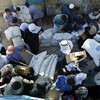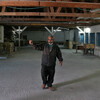
Faith-based coalition explores Israeli-Palestinian issue
2 March 2006
The second keynote speaker, Ali Abunimah, compared the current status of Palestinians to the apartheid of South Africa. The writer and commentator on Middle East and Arab-American affairs called for action on the part of Americans. He said, “If you don’t want violence, it’s up to you to provide an alternative.” Abunimah called for boycotts of Israeli products and investments. He also urged those present to contact American legislators who are appropriating funds to the Israeli government. He concluded, “It’s not an option to stay neutral between the strong and the weak because then you are siding with the strong.” Read more about Faith-based coalition explores Israeli-Palestinian issue








